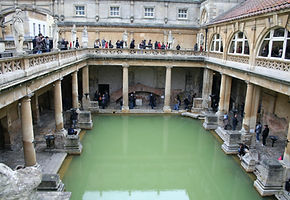Elena Perea Úbeda-Portugués

An experiencial journal in English as a forum to extend language use & reflect on language awareness.
Tuesday 7th
As it was the first official day of the course we were anxious to start the lessons and get a taste of the course in general. As experienced teachers we all had great expectations of the course. I believe it will be very hard not to go over something we have seen or done before (although it is never hurts to review something that it is widely considered useful in education) but I must say that I never seem to spend a minute in the classroom without learning something new from the teacher or from another classmate.
In the afternoon, I took up the offer of joining the gym with Beverly, my host. I think it can be a good opportunity to talk to her on the way there and back, to unwind from the work on the course and perhaps to interact with other native speakers in the gym.
Generally speaking, I am quite the television fan. I don't watch any television in Spain but I download British and American shows on a daily basis. This habit has been one of the greatest sources of authentic input I have been exposed to over the years. It is also a great proof that when a learner is interested in the topic and the input the learning outcome is remarkable. To be quite honest, I missed some programmes that I watched when I lived here back in 2011 and I was eager to watch some others that I heard people talk about.
Wednesday 8th
I have come to accept the fact that summer is officially over. I think autumn is over too and this is now winter. I know this is just me because obviously British people feel this is mild weather. Spotting a British person in Madrid is easy since most assume we live in perpetual summer and dress accordingly and spotting a Spaniard is also easy here since we seem to be cold all the time and layer like onions. I like to pick up on these subtle differences because I believe weather has a great impact on the day to day activities of a nation that then define the culture and perhaps create stereotypes. Therefore, thinking in reverse, we can trace stereotypes all the way back to traditions and historic events.
Therefore, I am very much enjoying the language strand of the course this time. I say this time because the last course I did on teaching improvement and CLIL methodology in 2013 was outstanding but the language improvement lessons were a bit too easy or a bit too tedious, at least for my taste. I like using current affairs to discover cultural aspects of the country and discuss their views on different topics since the UK has a strong voice within the European Union and that directly affects Spanish policies nowadays after the economic crisis.
I have also enjoyed having a drink at The Fox with teachers, mentors and social organisers since it gave us an opportunity to get to know each other a bit better and speak in a different environment.
Thursday 9th
Today we have started another strand of the programme with Francisco and it has given me a few ideas for activities that we can try in the classroom. I value his presence in the programme in a special way since he knows the reality we work with and he has a deep knowledge of what is doable in our classrooms and what is too far-fetched for our reality.
In the afternoon I did one of the things I found the scariest in the past: talk to strangers out of nowhere. A few years ago I found the idea of someone starting small talk to me in the street or a pub absolutely weird and terrifying in some cases. Why would someone just talk to someone else out of the blue? Surely they must want something. What are you supposed to answer back? With time I have become more comfortable with this idea but it was a few months ago, after watching a random YouTube video that I found on Facebook, that I decided it was time to get out of that comfort zone and be the weirdo that starts conversations out of nowhere. I have been doing this with my host family, shop employees and today, doing a survey on the streets. It feels amazing! I can't believe I had so much trouble doing this before. You never know who you are going to meet and what you might learn from them about English or about life. I also find it very gratifying that a situation that I saw as jumping in the deep end a few years ago has now become something routine that requires almost no effort. I can't believe I have learnt so much English being so incredibly shy about those types of interactions before.
Friday 10th
Today we have been working on needs analysis in the classroom. I usually use a KWL diagram at the beginning of my science lessons but due to lack of time I rarely come back to it at the end of the lessons. It is quite interesting since lack of time to plan lessons properly has been one of the areas I thought I had to improve as a teacher. In my personal experience it is quite common to have quite a lot of paperwork backlogged, especially at the begining of the year, and therefore lesson planning takes a back seat sometimes.
I also find that needs analysis, although taken into account in school has a very low impact in some areas. For instance, teachers meet every term to discuss students that may need extra support in the classroom. However, when it comes to designing a plan for improving the performance of those students we are far too vague and far too ineffective for it to work properly.
Also, needs analysis in terms of content to teach is basically useless since we don’t have time to expand on topics and we are given which content we must teach every year.
Saturday 11th
Today we have enjoyed going on a lovely trip to Bath. I had been there before but since I had the opportunity to go again I decided to visit the roman baths and walk around the town a little bit. Having been provided with an audio guide, I was determined to listen to all the tracks I encountered along the visit as well as some of the tracks aimed at children. This was particularly interesting since the approach to educate adults about the romans and the baths is very different from the approach they had for children. We had been talking about using too much boring jargon and complicated grammar when teaching children content in English. Obviously some of the jargon is always needed but that doesn't mean that we have to opt for boring serious language all throughout a lesson. The visit lasted for more than an hour and it was quite rare to find children complaining along the way because they were quite interested in what they were seeing and listening to. After that, since I had seen a bookshop having a clearance sale, I felt obliged to take the opportunity to buy some more books with worksheets and stories that will be very useful to me and my co-workers.





Personal Reflective Journal
Sunday 12th
As we are very eager to discover places around Bognor, today we decided to head to Chichester for a bit of sightseeing and perhaps a bit of shopping. We've visited the cathedral and walked along the roman walls before having lunch at a local pub located in a former church. It was a very nice location to enjoy some typical food. We had a lengthy conversation about the names of some dishes here and the things we should try. Shopping in Chichester was good too. After coming back home we have enjoyed a Sunday roast. I chatted with Beverly about the typical dishes that we traditionally have for lunch in Spain on a Sunday.
I now intend to enjoy the next episode of Downton Abbey which I very much enjoy since it is a pleasure to hear them talk and compare it to the current way of speaking. We are working on this topic in class and as an English teacher I appreciate how language has changed over time.

Monday 13th
New week, new challenges. Today we did our mini presentations for our projects. It has been a great learning experience not just for how to present and how to guide students through the process of making a presentation but also on how to give feedback. In my opinion giving feedback is one of the neglected areas in teacher training in Spain. We traditionally focus on marking what's right and what's wrong and tend to give very little feedback on how to improve. Praising for effort is something we overlook too. I noticed this specially when American language assistants talk to the students and say things such as "well done, just have a look here...", " I can see you've made an effort but I know you can do it better if you look again", etc. because they haven't got any teacher training so they are tapping into what their teacher did with them. Some people argue children are now applauded even if they didn't try at all. Maybe so, however I doubt that plain criticism and getting upset is going to improve their performance more than positive comments on what they did right. Therefore I really enjoyed working on the "sandwich technique" not just because you ease people into a constructive critique but also because you spend double the amount of your speech focusing on the positive instead of the negative. That not only improves the self-esteem in students but also contributes to the culture of effort that we want to create in a classroom.

Tuesday 14th
Today has been one of those days when you really feel your time in class has been worth it. In the language improvement lesson we had to do a role-play discussion to come to an agreement about whether a strike is the solution to the education system problems. I was the Secretary of State for Education and therefore had to defend the government’s position about the measures being taken. We had limited time to do research about the measures introduced by the government and how to defend them. I found a video of Nicola Ann Morgan (the actual Education Secretary) defending some policies particularly helpful since I could analyse the language and the way she defends the measures. We didn’t come to an agreement but I did found playing this role very useful. If I can defend something I don’t completely agree with this strongly I am sure I can defend something I’m passionate about very well.
In the afternoon we had another interesting lesson about planning with Francisco. As teachers, the more you gain experience the less you need to plan. I’ve always remembered that the process of planning a lesson can’t take longer than teaching that particular lesson. There are definitely some aspects to improve but we were able to do a very deep analysis and come to a conclusion about the essential parts to include.
